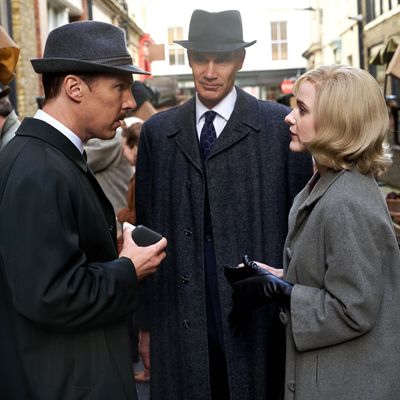
Benedict Cumberbatch makes for a good bore. Despite that distinctive face and that low, sensuous drone of a voice ÔÇö or maybe because of them ÔÇö thereÔÇÖs a comforting sturdiness to him that makes him ideal for playing resoundingly ordinary people. In Dominic CookeÔÇÖs The Courier, Cumberbatch plays an unremarkable British businessman who gets roped into an elaborate Cold War espionage scheme in the early 1960s. ItÔÇÖs the kind of role for which an extraordinary, unpredictable actor just will not do. A Daniel Day-Lewis or a Gary Oldman would be completely lost in the part. You need a great actor who can nevertheless exude conventionality.
Cumberbatch is quite appealing as Greville Wynne, an unassuming, deferential engineer and salesman whose frequent business trips to Eastern Europe in the 1950s prompted American and British spy services to enlist him in ferrying messages from Colonel Oleg Penkovsky (Merab Ninidze), a higher-up in the USSRÔÇÖs military intelligence agency. These efforts led to key intelligence about the Soviet military buildup in Cuba, which brought the world to the brink of nuclear war in 1962 but also wound up establishing a direct line between Moscow and Washington, thus presumably saving the planet from future calamities. ItÔÇÖs one of the most remarkable espionage stories of the 20th century, but The Courier wisely presents it as a tale of personal loyalty instead of geopolitics or spycraft.
Cooke and screenwriter Tom OÔÇÖConnor even give Greville and OlegÔÇÖs relationship the subtle aura of a clandestine romance. Walking down a dark Moscow street one night after their first meeting, their voices breaking with anticipation and fear, the men chat quietly. ÔÇ£We can talk here, it is safe,ÔÇØ Oleg says, then continues: ÔÇ£IÔÇÖve dreamt of this moment for a very long time. I wish I could tell you how much this means.ÔÇØ After he delivers Oleg (code-named ÔÇ£Ironbark,ÔÇØ which was the filmÔÇÖs original, far more evocative title when it premiered at Sundance last year) to the hotel room where his CIA handler, Emily (Rachel Brosnahan), is waiting, the door slowly, agonizingly shuts on GrevilleÔÇÖs face, and itÔÇÖs not hard to imagine him as a dismissed lover. WhatÔÇÖs more, as his trips to Moscow become more frequent, GrevilleÔÇÖs impatience with his family back home grows, and his wife, Sheila (Jessie Buckley) starts to suspect there might be another woman in the picture.
This notion of the espionage connection as a kind of love affair is not a cheap or meaningless one. (ItÔÇÖs also not new; this is prime John le Carr├® territory.) The platonic love that develops between these two men does become critical later in the story, as their situation becomes more desperate. The film builds suspense not on OlegÔÇÖs revelations ÔÇö even the Cuban Missile Crisis is mostly treated as background noise ÔÇö but on the increasingly codependent nature of the relationship between him and Greville. One becomes the key to the other, which makes every turn in their friendship that much more tense.
Cumberbatch is terrific, but the real attraction here is the great Georgian actor Ninidze, who can relay an entire novelÔÇÖs worth of information with just a couple of glances. Early in the film, Oleg takes Greville to the ballet. There, up in a balcony seat, is Soviet leader Nikita Khrushchev, the man whose increasing power and madness has already terrified this career Soviet officer and war hero into a life of treason. Oleg looks at the ogre above him with abject terror, and watching Ninidze, we can practically feel the pit opening in his stomach. Then, Oleg turns to the stage ÔÇö a stage we never actually see ÔÇö and his gaze starts to change, his eyes suddenly coming to life with the dreamy light of a better future. The Courier is a serviceable espionage drama and history lesson, but whenever these two actors are onscreen together, it approaches the sublime.


